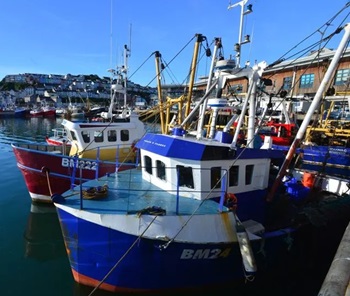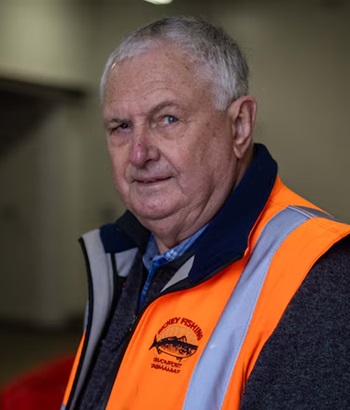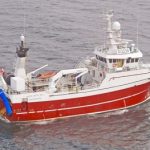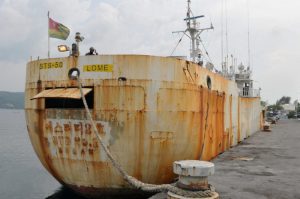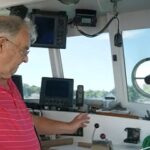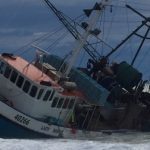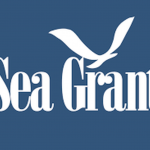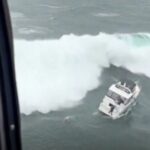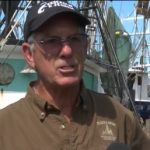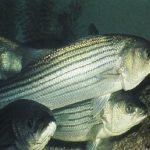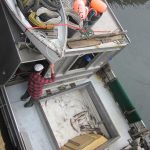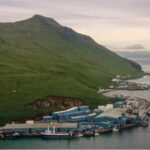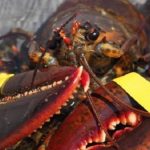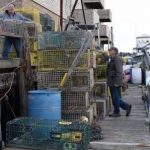Tag Archives: commercial fishing
With Trump, New Bedford’s fishermen hope for better times
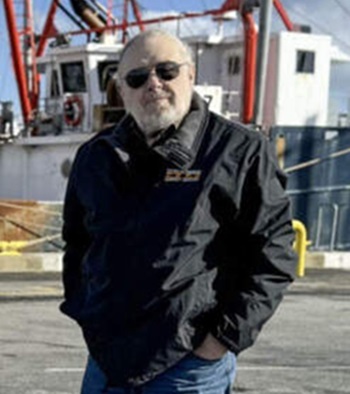 A cold wind cut across New Bedford harbor as Jim Kendall, a retired scallop boat captain, surveyed the city’s main fishing pier. Many of the boats sat idle, while a few crew members cleaned their decks and repaired equipment. Kendall remembers how busy these docks used to be years ago, when there were fewer regulations and closures, and fishermen could head out most days of the year. Now, “if you can fish, say, 60 days a year, you’re doing pretty damn good,” he said. New Bedford is the most valuable commercial fishing port in the country, landing hundreds of millions of dollars’ worth of seafood every year. But Kendall said bringing in that haul is getting harder, and the margins tighter. He blames Washington, and specifically the Democratic party, for the change in fortunes. more, >>CLICK TO READ<< 07:14
A cold wind cut across New Bedford harbor as Jim Kendall, a retired scallop boat captain, surveyed the city’s main fishing pier. Many of the boats sat idle, while a few crew members cleaned their decks and repaired equipment. Kendall remembers how busy these docks used to be years ago, when there were fewer regulations and closures, and fishermen could head out most days of the year. Now, “if you can fish, say, 60 days a year, you’re doing pretty damn good,” he said. New Bedford is the most valuable commercial fishing port in the country, landing hundreds of millions of dollars’ worth of seafood every year. But Kendall said bringing in that haul is getting harder, and the margins tighter. He blames Washington, and specifically the Democratic party, for the change in fortunes. more, >>CLICK TO READ<< 07:14
How Jake Anderson Lost the F/V Saga on ‘Deadliest Catch’
 As proven in the 20 seasons of Deadliest Catch, nothing is for certain. Things can change on a whim, and security is something not to take for granted. Fan-favorite Jake Anderson has learned this the hard way. After putting everything into the F/V Saga, Jake suddenly lost control of the boat he part-owned when he was served a repossession note. With the timing coinciding with the Red King Crab fishery reopening and a derby-style race underway, Jake was essentially lost at sea. Captain Jake Anderson has been a staple on the Discovery Channel series Deadliest Catch since 2007. When he started in the industry nearly 18 years ago, he began working as a greenhorn on the F/V Northwestern. Through his time in the industry, Jake has tried his hand at every job in his career, ranging from deckhand, deck boss, engineer, captain, and vessel owner. With his focus mainly on the operations side at the helm of F/V Saga, Jake’s world was turned upside down. more, >>CLICK TO READ<< 12:18
As proven in the 20 seasons of Deadliest Catch, nothing is for certain. Things can change on a whim, and security is something not to take for granted. Fan-favorite Jake Anderson has learned this the hard way. After putting everything into the F/V Saga, Jake suddenly lost control of the boat he part-owned when he was served a repossession note. With the timing coinciding with the Red King Crab fishery reopening and a derby-style race underway, Jake was essentially lost at sea. Captain Jake Anderson has been a staple on the Discovery Channel series Deadliest Catch since 2007. When he started in the industry nearly 18 years ago, he began working as a greenhorn on the F/V Northwestern. Through his time in the industry, Jake has tried his hand at every job in his career, ranging from deckhand, deck boss, engineer, captain, and vessel owner. With his focus mainly on the operations side at the helm of F/V Saga, Jake’s world was turned upside down. more, >>CLICK TO READ<< 12:18
What happened to the 3,000 pounds of haddock seized in a fish-plant bust?
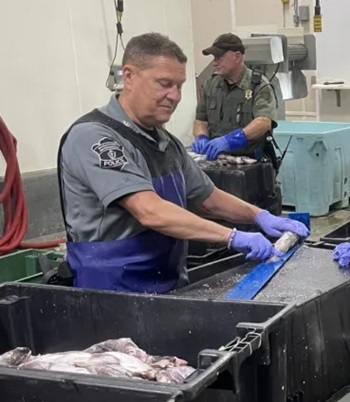 Acting Colonel Patrick Moran of the Massachusetts Environmental Police had a problem: 3,000 pounds of confiscated haddock on the New Bedford waterfront. The law against undersized catch had been enforced, but now what? Out of a total load of 11,000 pounds that came off the boat, the seized fish had come up short of the required 16-inch length, Moran said at the time. Seized on Thursday, June 20, as Moran was making rounds of local fish processing houses, there it sat in a plant that the MEP declined to name. He knew Shelley Edmundson, a founding member and executive director of the Martha’s Vineyard Fishermen’s Preservation Trust, a nonprofit devoted to sustaining the island’s fishing culture. He made a call. His timing could have been better, and it could have been worse. But, this big load of haddock would be complicated, she said. more, >>CLICK TO READ<< 15:54
Acting Colonel Patrick Moran of the Massachusetts Environmental Police had a problem: 3,000 pounds of confiscated haddock on the New Bedford waterfront. The law against undersized catch had been enforced, but now what? Out of a total load of 11,000 pounds that came off the boat, the seized fish had come up short of the required 16-inch length, Moran said at the time. Seized on Thursday, June 20, as Moran was making rounds of local fish processing houses, there it sat in a plant that the MEP declined to name. He knew Shelley Edmundson, a founding member and executive director of the Martha’s Vineyard Fishermen’s Preservation Trust, a nonprofit devoted to sustaining the island’s fishing culture. He made a call. His timing could have been better, and it could have been worse. But, this big load of haddock would be complicated, she said. more, >>CLICK TO READ<< 15:54

Beloved MS Coast Hall of Fame shrimper remembered as kind, humble and ‘full of grace’
Day after day, Richard Kopszywa shrimped from his old wooden boat named F/V Linda K, and carefully repaired it so the vessel still ran after decades. “He used to tell me, ‘If I can’t shrimp or if I can’t get out on the water, I think I will probably just die,” his wife, Shelley Kopszywa, said. “It was in his veins.” Now, his family is grieving after authorities found Kopszywa near Deer Island last week, two days after his wife reported him missing and the Coast Guard found the Linda K empty, five miles from shore. Shelley Kopszywa said she believes her husband died doing what he loved, so she is at peace. Kopszywa was humble, his wife said, and probably would not have liked all this attention. But she loves him too much to listen. He was the kind of man who helped her down the steps, she said, and always opened the door for her. “Full of grace,” she said. more, >>CLICK TO READ<< 06:47
Climate change makes winners and losers out of cod and snow crab, says scientist
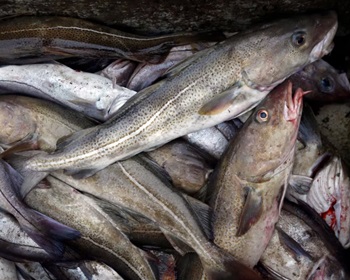 A team of scientists used modelling to look into the effects of climate change on three Grand Banks fish species. They anticipate that warmer waters could lead to biomass declines for snow crab and yellowtail flounder but gains for Atlantic cod. “That’s one thing that we see when we’re looking at the impacts of climate change on marine ecosystems and oceans, is that there are winners and losers. So it’s not as though everything is going to be negatively impacted,” said Tyler Eddy, a scientist with Marine Institute’s Centre for Fisheries Ecosystems Research. Species that thrive or struggle in these scenarios will depend on their thermal preferences and changes in a region, he said, adding a specific species might also leave a region to follow their preferred temperature. more, >>CLICK TO READ<< 10:06
A team of scientists used modelling to look into the effects of climate change on three Grand Banks fish species. They anticipate that warmer waters could lead to biomass declines for snow crab and yellowtail flounder but gains for Atlantic cod. “That’s one thing that we see when we’re looking at the impacts of climate change on marine ecosystems and oceans, is that there are winners and losers. So it’s not as though everything is going to be negatively impacted,” said Tyler Eddy, a scientist with Marine Institute’s Centre for Fisheries Ecosystems Research. Species that thrive or struggle in these scenarios will depend on their thermal preferences and changes in a region, he said, adding a specific species might also leave a region to follow their preferred temperature. more, >>CLICK TO READ<< 10:06
Trawlerman Jimmy Buchan: I earned £12 fishing 6 days a week at 14
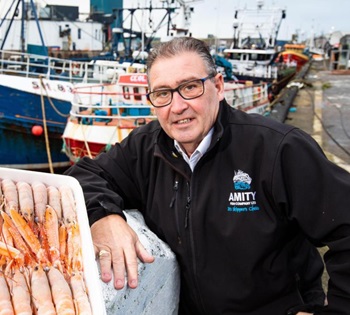 Jimmy Buchan appeared in the Bafta-winning BBC series Trawlermen (2006-10) and published his memoir, Trawlerman: Life at the Helm of the Toughest Job in Britain, in 2011. The former skipper of Amity II has 40 years’ experience of North Sea fishing and has been running his own seafood supply company, Amity Fish, since 2019. Now 64, he is the chief executive of the Scottish Seafood Association and still lives in his home town of Peterhead, Aberdeenshire, with his wife, Irene. They have two grown-up daughters, Jenna and Amy. Photos, more, >>CLICK TO READ<< 08:29
Jimmy Buchan appeared in the Bafta-winning BBC series Trawlermen (2006-10) and published his memoir, Trawlerman: Life at the Helm of the Toughest Job in Britain, in 2011. The former skipper of Amity II has 40 years’ experience of North Sea fishing and has been running his own seafood supply company, Amity Fish, since 2019. Now 64, he is the chief executive of the Scottish Seafood Association and still lives in his home town of Peterhead, Aberdeenshire, with his wife, Irene. They have two grown-up daughters, Jenna and Amy. Photos, more, >>CLICK TO READ<< 08:29
Continuation of lobster quality and moult survey very important to southwestern NS industry
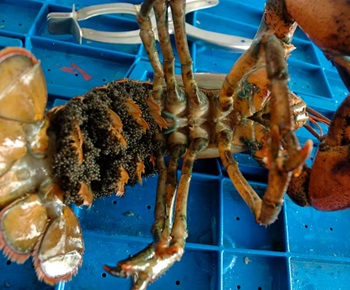 Every fall since 2005, in advance of the commercial lobster fishery opening in Lobster Fishing Areas (LFA) 33 and 34, a scientific survey has been conducted in the waters around southwestern Nova Scotia. “The overall objective of the Atlantic Lobster Moult and Quality (ALMQ) Survey is to develop an ongoing monitoring program, based on biological indicators of moult-timing, quality and environmental conditions, to predict the quality of lobsters at the start of the lobster seasons in LFAs 33 and 34,” says Heather Mulock, executive director of the Coldwater Lobster Association. “The data collected is used to establish a framework for adaptation decision-making for the lobster sector, including ensuring better product marketability, live storage, and international shipping valuation.” more, >>CLICK TO READ<< 07:10
Every fall since 2005, in advance of the commercial lobster fishery opening in Lobster Fishing Areas (LFA) 33 and 34, a scientific survey has been conducted in the waters around southwestern Nova Scotia. “The overall objective of the Atlantic Lobster Moult and Quality (ALMQ) Survey is to develop an ongoing monitoring program, based on biological indicators of moult-timing, quality and environmental conditions, to predict the quality of lobsters at the start of the lobster seasons in LFAs 33 and 34,” says Heather Mulock, executive director of the Coldwater Lobster Association. “The data collected is used to establish a framework for adaptation decision-making for the lobster sector, including ensuring better product marketability, live storage, and international shipping valuation.” more, >>CLICK TO READ<< 07:10
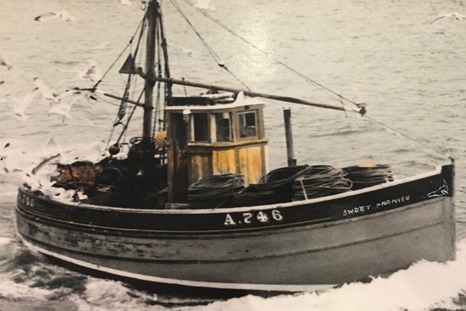
Launched as Sweet Promise A 746 in 1965, this Noble’s-built stalwart, Tern LH 53, has clocked up almost 60 years’ service
The 33ft Tern, which today is based at Port Seton, was built in 1965 by Jimmy Noble as Sweet Promise A 746 for Robbie Cormack and Ian Balgowan of Stonehaven, at a cost of £6,000. At the time she was unique, said Ian, as she had a wheelhouse amidships with a winch behind. According to the Noble build lists, she was built for ‘Mr Cormack’ – but she was originally registered to Ian. Gordon told me he imagined she had been built for the boatbuilder’s son, as ‘she was built like a brick shithouse, larch on oak’. The frames were so close together, he said, that back aft on the return you could not see the planks. Gordon continued: “She was tough as they come, so I rigged her for scallops with three dredges each side and worked mainly in Falmouth Bay, away from the Looe fleet, close inshore. Best catch was just over 800 dozen for a trip. Photos, more, >>CLICK TO READ<< 13:44
Donegal fishermen frustrated as general election looms: ‘We are the fish basket of Europe, yet we’re the poor relation’
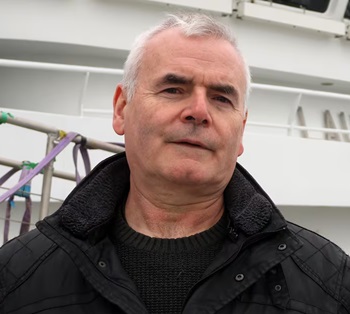 This should be the busiest time of year. Pelagic fish, the species found near the surface of the ocean, are most plentiful in the North Atlantic from late autumn to early summer. The season peaks either side of Christmas, but every fishing vessel is tied up at the pier. Local fisherman Denis Carbery landed 1,100 tonnes of mackerel last month from his trawler, Lauren, and that was it for the year; he will not take to sea again until January. Charlie Doherty’s fishing vessel Áine has not gone to sea since March because of quotas. It’s an impressive vessel, just seven years old. Doherty is scathing of all the political parties, wondering why there are no Irish MEPs on the EU fisheries committee while Hungary, a landlocked country, has representatives on it. more, >>CLICK TO READ<< 09:38
This should be the busiest time of year. Pelagic fish, the species found near the surface of the ocean, are most plentiful in the North Atlantic from late autumn to early summer. The season peaks either side of Christmas, but every fishing vessel is tied up at the pier. Local fisherman Denis Carbery landed 1,100 tonnes of mackerel last month from his trawler, Lauren, and that was it for the year; he will not take to sea again until January. Charlie Doherty’s fishing vessel Áine has not gone to sea since March because of quotas. It’s an impressive vessel, just seven years old. Doherty is scathing of all the political parties, wondering why there are no Irish MEPs on the EU fisheries committee while Hungary, a landlocked country, has representatives on it. more, >>CLICK TO READ<< 09:38
South Carolina shrimpers applaud decision to impose duties on shrimp imported from four countries
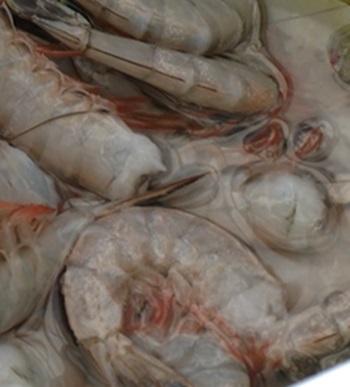 South Carolina shrimpers are celebrating the U.S. International Trade Commission’s recent decision to crack down on frozen shrimp imports from four countries. The ITC voted in favor of issuing countervailing duties on frozen, warm-water shrimp imports from Ecuador, India, and Vietnam after the U.S. Department of Commerce determined those governments were illegally subsidizing the industry. “We’re grateful because it’s an acknowledgment of what we feel and we experience in the industry and we see on a daily basis,” said Bryan Jones, a first-generation shrimper who lives in McClellanville. Jones serves as vice president of the South Carolina Shrimpers Association and was among a group of commercial fishermen who testified before the ITC in Washington, D.C. in October. more, >>CLICK TO READ<< 14:20
South Carolina shrimpers are celebrating the U.S. International Trade Commission’s recent decision to crack down on frozen shrimp imports from four countries. The ITC voted in favor of issuing countervailing duties on frozen, warm-water shrimp imports from Ecuador, India, and Vietnam after the U.S. Department of Commerce determined those governments were illegally subsidizing the industry. “We’re grateful because it’s an acknowledgment of what we feel and we experience in the industry and we see on a daily basis,” said Bryan Jones, a first-generation shrimper who lives in McClellanville. Jones serves as vice president of the South Carolina Shrimpers Association and was among a group of commercial fishermen who testified before the ITC in Washington, D.C. in October. more, >>CLICK TO READ<< 14:20
And they’re off! The 2024-25 lobster season in southwestern Nova Scotia opens with Dumping Day
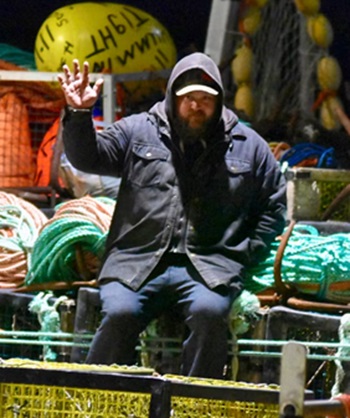 Following a one-day weather delay, the six-month commercial lobster fishery in southwestern Nova Scotia and along the province’s south shore opened on the morning of Nov. 26 with light winds to send off the crews. Referred to as Dumping Day, here are some photos from parts of Yarmouth County as boats left their wharfs and harbours in LFA 34 to head to the fishing grounds. The season started at 5 a.m., which is an hour earlier than normal, to capitalize on the lighter winds. Lots of photos, more, >>CLICK TO READ<< 08:06
Following a one-day weather delay, the six-month commercial lobster fishery in southwestern Nova Scotia and along the province’s south shore opened on the morning of Nov. 26 with light winds to send off the crews. Referred to as Dumping Day, here are some photos from parts of Yarmouth County as boats left their wharfs and harbours in LFA 34 to head to the fishing grounds. The season started at 5 a.m., which is an hour earlier than normal, to capitalize on the lighter winds. Lots of photos, more, >>CLICK TO READ<< 08:06
UPDATE: Body found in Biloxi identified as missing 75-year-old shrimper
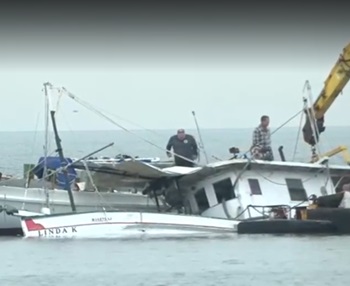 Harrison County Coroner Brian Switzer says the body found Tuesday morning between Biloxi Beach and Deer Island is missing shrimper Richard Kopszywa. The 75-year-old Biloxi man went missing from the F/V Linda K shrimp boat. The boat sank while being towed to shore near the western tip of Deer Island. Three days earlier, Ricky Kopszywa took his shrimp boat out to fill some last-minute orders for Thanksgiving, his family said. When his wife didn’t hear from him Sunday, she reported him missing. The Coast Guard found his boat, the Linda K, five miles offshore. The boat passed down from Ricky’s father was named after Ricky’s oldest sister. Video, more, >>CLICK TO READ<< 20:35
Harrison County Coroner Brian Switzer says the body found Tuesday morning between Biloxi Beach and Deer Island is missing shrimper Richard Kopszywa. The 75-year-old Biloxi man went missing from the F/V Linda K shrimp boat. The boat sank while being towed to shore near the western tip of Deer Island. Three days earlier, Ricky Kopszywa took his shrimp boat out to fill some last-minute orders for Thanksgiving, his family said. When his wife didn’t hear from him Sunday, she reported him missing. The Coast Guard found his boat, the Linda K, five miles offshore. The boat passed down from Ricky’s father was named after Ricky’s oldest sister. Video, more, >>CLICK TO READ<< 20:35
Dumping day begins in southwestern Nova Scotia with calm conditions
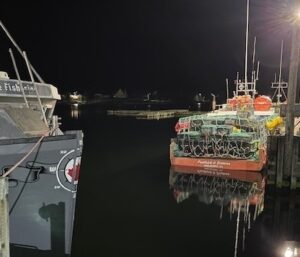 Dumping day began with much fanfare in southwestern Nova Scotia early Tuesday morning. Fireworks signaled the start of the commercial lobster season in Sambro, with loved ones waving goodbye from the wharf where crowds gathered to see the fishers off. “It’s an exciting morning, we always all come down and watch the fireworks, as they go out, it’s a pretty big day for everybody,” said Briana Beaver, whose partner is a fisher. Dumping day for lobster fishing areas 33 and 34 is typically the final Monday of November, but there was a one-day delay this year due to rough weather. While conditions were calm Tuesday, boats that work in LFA 34, which extends from Shelburne County around the southwest coast of the province, were allowed to leave a bit earlier at 5 a.m. Photos, Video, more, >>CLICK TO READ<< 10:30
Dumping day began with much fanfare in southwestern Nova Scotia early Tuesday morning. Fireworks signaled the start of the commercial lobster season in Sambro, with loved ones waving goodbye from the wharf where crowds gathered to see the fishers off. “It’s an exciting morning, we always all come down and watch the fireworks, as they go out, it’s a pretty big day for everybody,” said Briana Beaver, whose partner is a fisher. Dumping day for lobster fishing areas 33 and 34 is typically the final Monday of November, but there was a one-day delay this year due to rough weather. While conditions were calm Tuesday, boats that work in LFA 34, which extends from Shelburne County around the southwest coast of the province, were allowed to leave a bit earlier at 5 a.m. Photos, Video, more, >>CLICK TO READ<< 10:30
Alaska’s total commercial salmon harvest this year was ultra-low in both quantity and value
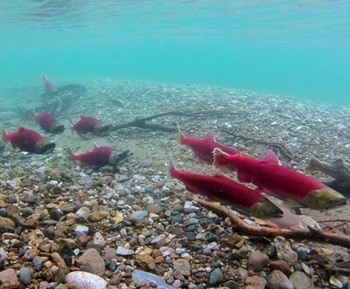 The number of Alaska salmon harvested by commercial fishers was the third smallest since all-species records began in 1985, and the value to harvesters, when adjusted for inflation, was the lowest reported since 1975, state officials said. Additionally, the 450 million pounds of salmon that the total harvest contained was the lowest on record, officials said. The totals come from a preliminary recap of this year’s salmon season issued on Nov. 18 by the Alaska Department of Fish and Game. Only 101.2 million salmon were harvested this year, less than half the 232.2 million harvested last year, the department reported. The money paid to fishers for their catches, known as ex-vessel value, totaled $304 million, down from $398 million last year, the department said, In the Bristol Bay region, site of the world’s biggest sockeye runs, this year’s return was well above projections and 7% higher than the 20-year average, though the amount commercially harvested was a bit below the average. more, >>CLICK TO READ<< 16:09
The number of Alaska salmon harvested by commercial fishers was the third smallest since all-species records began in 1985, and the value to harvesters, when adjusted for inflation, was the lowest reported since 1975, state officials said. Additionally, the 450 million pounds of salmon that the total harvest contained was the lowest on record, officials said. The totals come from a preliminary recap of this year’s salmon season issued on Nov. 18 by the Alaska Department of Fish and Game. Only 101.2 million salmon were harvested this year, less than half the 232.2 million harvested last year, the department reported. The money paid to fishers for their catches, known as ex-vessel value, totaled $304 million, down from $398 million last year, the department said, In the Bristol Bay region, site of the world’s biggest sockeye runs, this year’s return was well above projections and 7% higher than the 20-year average, though the amount commercially harvested was a bit below the average. more, >>CLICK TO READ<< 16:09
Going after the big fish: New union president vows to take on whoever stands in the way of Newfoundland and Labrador fishery
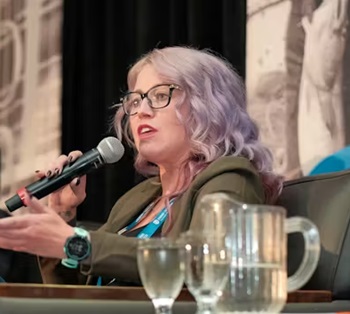 Vibes of positive energy permeated FFAW-Unifor’s recent annual convention in Gander, and the union’s new president hopes to carry that momentum forward into what she envisions will be a new era for the fishery in Newfoundland and Labrador. Dwan Street is the first woman to ever hold the presidency of the union that represents the province’s inshore fish harvesters and plant workers, and she’s ready to roll up her sleeves and get to work now that the convention celebration is over. She’s not interested in discrediting any past executives, but Street said it’s clear there needs to be fresh, new approaches to helping make life better for harvesters and plant workers. more, >>CLICK TO READ<< 08:52
Vibes of positive energy permeated FFAW-Unifor’s recent annual convention in Gander, and the union’s new president hopes to carry that momentum forward into what she envisions will be a new era for the fishery in Newfoundland and Labrador. Dwan Street is the first woman to ever hold the presidency of the union that represents the province’s inshore fish harvesters and plant workers, and she’s ready to roll up her sleeves and get to work now that the convention celebration is over. She’s not interested in discrediting any past executives, but Street said it’s clear there needs to be fresh, new approaches to helping make life better for harvesters and plant workers. more, >>CLICK TO READ<< 08:52
Nova Scotia Lobster Season Faces Wind Delays Again
 Weather conditions push back the much-anticipated opening day for the region’s commercial lobster fishery Strong winds have once again delayed the opening of the commercial lobster season along the south shore of Nova Scotia. Scheduled to commence on Monday, November 25, the season’s launch has been postponed due to weather conditions not cooperating with the fishermen’s plans. The forecast continues to show gale force winds, prompting industry officials to eye Tuesday, November 26, as the likely new opening day. This pattern of weather-related delays is nothing new for lobster fishers who have seen the impact of harsh conditions on their opening days for years. The season is set by regulation to start on the last Monday of November, but as was the case this year, it frequently doesn’t go according to plan. more, >>CLICK TO READ<< 06:56
Weather conditions push back the much-anticipated opening day for the region’s commercial lobster fishery Strong winds have once again delayed the opening of the commercial lobster season along the south shore of Nova Scotia. Scheduled to commence on Monday, November 25, the season’s launch has been postponed due to weather conditions not cooperating with the fishermen’s plans. The forecast continues to show gale force winds, prompting industry officials to eye Tuesday, November 26, as the likely new opening day. This pattern of weather-related delays is nothing new for lobster fishers who have seen the impact of harsh conditions on their opening days for years. The season is set by regulation to start on the last Monday of November, but as was the case this year, it frequently doesn’t go according to plan. more, >>CLICK TO READ<< 06:56
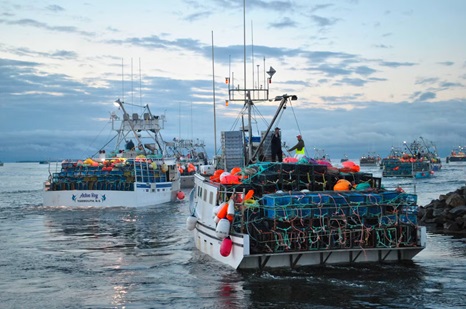
Past lobster season opener hits and misses in southwestern Nova Scotia
The majority of time if the scheduled opening day of the lobster season in southwestern Nova Scotia doesn’t go according to plan, it’s because the weather and safety concerns have forced a postponement. The lobster season is always slated to open the last Monday of November. Strong winds are preventing that once again from happening on Monday, Nov. 25 for the start of the 2024-25 season. Tuesday, Nov. 26, has been identified as the more favourable option with industry weather calls happening the morning of Monday, Nov. 25 in LFAs 34 and 33 to confirm the season opening. While weather is always the culprit for a season opening delay, through time there have been other issues that have also had impacts on season starts. Here’s a look back at past season openers. Photos, more, >>CLICK TO READ<< 12:57
Newfoundland and Labrador recorded its highest lobster landings ever this past season
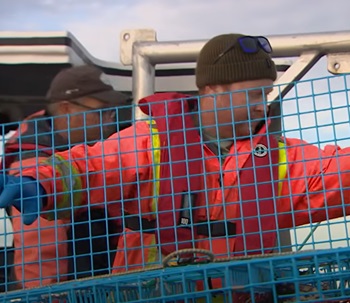 And so, this past spring, when I was hearing so much about the abundance of lobsters in our waters, I wanted to find out what was going on. I called around to several harvesters in various parts of the province to find out about their catch rates. The thing is, when lobsters are plentiful, lobster fishermen can be a tight-lipped bunch. I knew after a few phone calls, it would be hard to get anyone to go on camera for a Land & Sea show to brag about their bounty. And that was confirmed for me by Fortune Bay fisherman Alfred Fitzpatrick, who fishes out of Garnish on the Burin Peninsula. “Fellows will tell you they poached a moose before they tell you they caught a lobster. If you hauled 200 pots and you got 10 lobsters, and your brother asked you, you’d say, ‘Boy, I got five,'” explained Fitzpatrick. Video, more, >>CLICK TO READ<< 08:14
And so, this past spring, when I was hearing so much about the abundance of lobsters in our waters, I wanted to find out what was going on. I called around to several harvesters in various parts of the province to find out about their catch rates. The thing is, when lobsters are plentiful, lobster fishermen can be a tight-lipped bunch. I knew after a few phone calls, it would be hard to get anyone to go on camera for a Land & Sea show to brag about their bounty. And that was confirmed for me by Fortune Bay fisherman Alfred Fitzpatrick, who fishes out of Garnish on the Burin Peninsula. “Fellows will tell you they poached a moose before they tell you they caught a lobster. If you hauled 200 pots and you got 10 lobsters, and your brother asked you, you’d say, ‘Boy, I got five,'” explained Fitzpatrick. Video, more, >>CLICK TO READ<< 08:14
Nova Scotia: Safety Top Priority as Lobster Season Begins
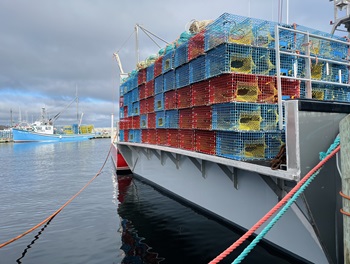 With the lobster season about to start, fishing crews in southwestern Nova Scotia are reminded to make safety a top priority. Dumping Day, as the first day of the season is known, will see thousands of lobster traps dumped along the south and western shores in lobster fishing areas 33 and 34. The start in both areas is weather dependent but is expected to be Monday, November 25. The Province urges fishers to take the time and necessary steps to stay safe. Fishing crews preparing to head out each day should: monitor the weather, assess their boats, check all vessel safety equipment to ensure it is inspected and accessible, prepare for emergencies. Occupational health and safety laws require all crew members to wear a life jacket or other personal flotation device. Links, more, >>CLICK TO READ<< 15:06
With the lobster season about to start, fishing crews in southwestern Nova Scotia are reminded to make safety a top priority. Dumping Day, as the first day of the season is known, will see thousands of lobster traps dumped along the south and western shores in lobster fishing areas 33 and 34. The start in both areas is weather dependent but is expected to be Monday, November 25. The Province urges fishers to take the time and necessary steps to stay safe. Fishing crews preparing to head out each day should: monitor the weather, assess their boats, check all vessel safety equipment to ensure it is inspected and accessible, prepare for emergencies. Occupational health and safety laws require all crew members to wear a life jacket or other personal flotation device. Links, more, >>CLICK TO READ<< 15:06
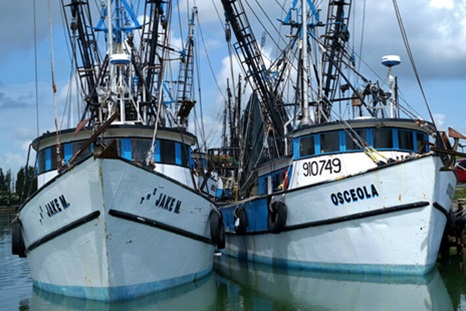
Struggling Valley shrimpers receive good news on new import measures
In an industry where bad news is the norm, shrimpers in Texas and elsewhere in the United States finally have a sliver of good news. The U.S. International Trade Commission, or ITC, on Tuesday determined that the U.S. shrimp industry is being “materially injured” by imports of frozen warm-water shrimp from Indonesia that the U.S. Department of Commerce says are being sold in this country at less than fair value, and also by shrimp imports from Ecuador, India and Vietnam that the Commerce Department says are being subsidized by the governments of those countries. As a result of the ITC’s determinations, the Commerce Department will issue “countervailing duty orders on imports of this product from Ecuador, India and Vietnam and an anti-dumping duty order on imports of this product from Indonesia,” the ITC announced Tuesday. more, >>CLICK TO READ<< 11:57
California’s Dungeness Crab Season Delayed Again, But Could Open in Time for Holidays
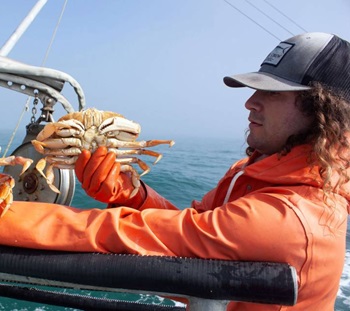 California Department of Fish and Wildlife officials have delayed the commercial Dungeness crab season statewide for the second time this year and extended a ban on recreational use of certain traps. There’s still a chance the commercial season for Bay Area crabbers could open earlier than the past few years, though, just in time for holiday dinners. Officials said they plan to reevaluate the region’s waters, which had been scheduled to open on Dec. 1, early next month. The restrictions are due to increased whale populations and their entanglement in crabbing gear. If the whales have finished passing through on their way south to winter breeding grounds, the Department of Fish and Wildlife said it could open the commercial season — and lift the recreational restrictions — statewide on Dec. 15. more, >>CLICK TO READ<< 07:08
California Department of Fish and Wildlife officials have delayed the commercial Dungeness crab season statewide for the second time this year and extended a ban on recreational use of certain traps. There’s still a chance the commercial season for Bay Area crabbers could open earlier than the past few years, though, just in time for holiday dinners. Officials said they plan to reevaluate the region’s waters, which had been scheduled to open on Dec. 1, early next month. The restrictions are due to increased whale populations and their entanglement in crabbing gear. If the whales have finished passing through on their way south to winter breeding grounds, the Department of Fish and Wildlife said it could open the commercial season — and lift the recreational restrictions — statewide on Dec. 15. more, >>CLICK TO READ<< 07:08
Maine: Judge dismisses case against the state challenging lobster boat tracking rules
![]() A federal judge has ruled against a group of five lobstermen that sued the state in attempt to stop electronic boat tracking requirements that went effect almost one year ago. The rules require lobstermen with federal fishing permits to install monitors on their boats that track their location on the water. The fishermen argued that they should not be subject to monitoring at all times. They often use their boats for other purposes beyond commercial lobstering, which Woodcock acknowledged. The boat tracking requirements will stay in place for now. But in his decision, Woodcock said the lobstermen had raised important Fourth Amendment questions and encouraged them to appeal the case. more, >>CLICK TO READ<< 11:21
A federal judge has ruled against a group of five lobstermen that sued the state in attempt to stop electronic boat tracking requirements that went effect almost one year ago. The rules require lobstermen with federal fishing permits to install monitors on their boats that track their location on the water. The fishermen argued that they should not be subject to monitoring at all times. They often use their boats for other purposes beyond commercial lobstering, which Woodcock acknowledged. The boat tracking requirements will stay in place for now. But in his decision, Woodcock said the lobstermen had raised important Fourth Amendment questions and encouraged them to appeal the case. more, >>CLICK TO READ<< 11:21
TSB says harsh weather, lack of contingency plan contributed to fatal vessel sinking
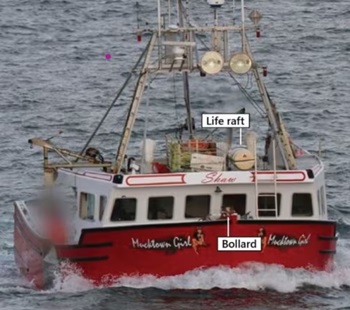 A fatal fishing vessel incident near Canso, N.S., in 2022 was caused in part by severe weather conditions and a lack of contingency planning for towing disabled vessels, according to the Transportation Safety Board of Canada. The board on Thursday released its investigative report into the rescue operation of the F/V Mucktown Girl, which resulted in the death of one of the halibut boat’s crew members and injuries to two Canadian Coast Guard crew. The Mucktown Girl, a 15-metre vessel with five people on board, was around 160 kilometres southeast of Canso when it experienced electrical problems and lost power late in the night on March 11, 2022. The crew contacted the Joint Rescue Coordination Centre in Halifax and the coast guard ship Jean Goodwill arrived the next morning. more, >>CLICK TO READ<< 08:08
A fatal fishing vessel incident near Canso, N.S., in 2022 was caused in part by severe weather conditions and a lack of contingency planning for towing disabled vessels, according to the Transportation Safety Board of Canada. The board on Thursday released its investigative report into the rescue operation of the F/V Mucktown Girl, which resulted in the death of one of the halibut boat’s crew members and injuries to two Canadian Coast Guard crew. The Mucktown Girl, a 15-metre vessel with five people on board, was around 160 kilometres southeast of Canso when it experienced electrical problems and lost power late in the night on March 11, 2022. The crew contacted the Joint Rescue Coordination Centre in Halifax and the coast guard ship Jean Goodwill arrived the next morning. more, >>CLICK TO READ<< 08:08
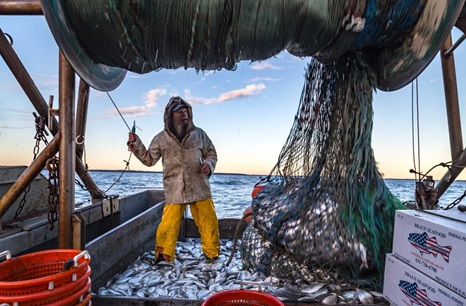
Commercial Fisherman Chris Hamilton Captures Life on the Water
One can only imagine what kinds of things true men of the sea witness while out on the water, their livelihood dependent on making good catches – quite a different sight from the landlubbers seeing traffic lights, stop signs, strip malls and so on. But Chris Hamilton, a lifelong Greenport resident and commercial fisherman, removed the need to imagine when he found a passion for photography aboard his father’s boat one morning. “Being a commercial fisherman on a trawler gives me a very unique perspective,” he says. “It’s not something 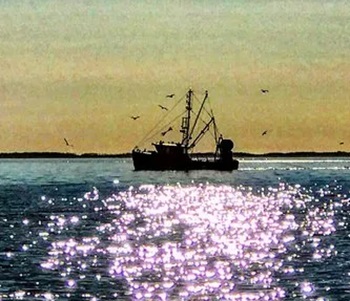 that is widely viewed. It’s a pretty private lifestyle. It really was just being in the moment and kind of just realizing how lucky I was to spend some of those moments on the water with my dad. Fishing is hard, man; it’s a really hard way to make a living, especially these days. You’ve got to be really dedicated. There’s a reason why we do it, and it’s because it’s a beautiful lifestyle. You get to experience nature and in a real way that’s different from other types of work, being on the water. Water is probably the biggest inspiration for me in terms of my art.” Photos, more, >>CLICK TO READ<< 07:01
that is widely viewed. It’s a pretty private lifestyle. It really was just being in the moment and kind of just realizing how lucky I was to spend some of those moments on the water with my dad. Fishing is hard, man; it’s a really hard way to make a living, especially these days. You’ve got to be really dedicated. There’s a reason why we do it, and it’s because it’s a beautiful lifestyle. You get to experience nature and in a real way that’s different from other types of work, being on the water. Water is probably the biggest inspiration for me in terms of my art.” Photos, more, >>CLICK TO READ<< 07:01
Safety board calls for changes two years after Nova Scotia fisherman’s death at sea
 An investigation into how the Canadian Coast Guard responded to a Nova Scotia vessel in distress two years ago raises questions about why one fisherman died after a towing operation went awry. In an investigation report released Thursday, the Transportation Safety Board says the fishing boat F/V Mucktown Girl was returning to Canso, N.S., with five crew aboard on March 11, 2022, when it was disabled by electrical problems. The captain called for a tow from the coast guard as a storm was closing in. After a seven-hour voyage, the Canadian Coast Guard Ship Jean Goodwill reached the drifting boat and attached a 300-metre tow line to the smaller vessel’s bollard. But as the weather turned rough, the bollard broke off six hours into the recovery mission. At that point, the decision was made to let the fishing crew ride out the storm aboard the F/V Mucktown Girl rather than attach another tow line that could damage the boat. more, >>CLICK TO READ<< 19:40
An investigation into how the Canadian Coast Guard responded to a Nova Scotia vessel in distress two years ago raises questions about why one fisherman died after a towing operation went awry. In an investigation report released Thursday, the Transportation Safety Board says the fishing boat F/V Mucktown Girl was returning to Canso, N.S., with five crew aboard on March 11, 2022, when it was disabled by electrical problems. The captain called for a tow from the coast guard as a storm was closing in. After a seven-hour voyage, the Canadian Coast Guard Ship Jean Goodwill reached the drifting boat and attached a 300-metre tow line to the smaller vessel’s bollard. But as the weather turned rough, the bollard broke off six hours into the recovery mission. At that point, the decision was made to let the fishing crew ride out the storm aboard the F/V Mucktown Girl rather than attach another tow line that could damage the boat. more, >>CLICK TO READ<< 19:40
California’s Squid Fishery: The Largest in the U.S. and an Economic Powerhouse
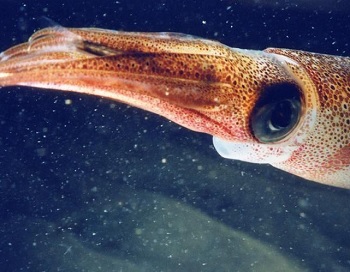 California holds a unique distinction in the United States as home to the largest squid fishery by both volume and revenue. While most Americans might think of squid as a side dish or appetizer at seafood restaurants, in California, market squid fishing has a deep-rooted history and serves as a significant contributor to the state’s commercial fishing economy. California’s market squid (Doryteuthis opalescens), commonly known as opalescent squid, not only drives revenue and jobs in the fishing industry but also exemplifies how sustainable practices are becoming integral to modern fisheries. From humble beginnings to MSC-certified status, California’s squid fishery is a fascinating example of how one invertebrate species has created waves in the fishing world. more, >>CLICK TO READ<< 15:21
California holds a unique distinction in the United States as home to the largest squid fishery by both volume and revenue. While most Americans might think of squid as a side dish or appetizer at seafood restaurants, in California, market squid fishing has a deep-rooted history and serves as a significant contributor to the state’s commercial fishing economy. California’s market squid (Doryteuthis opalescens), commonly known as opalescent squid, not only drives revenue and jobs in the fishing industry but also exemplifies how sustainable practices are becoming integral to modern fisheries. From humble beginnings to MSC-certified status, California’s squid fishery is a fascinating example of how one invertebrate species has created waves in the fishing world. more, >>CLICK TO READ<< 15:21
After a dramatic decline, lake trout have recovered in most of Lake Superior
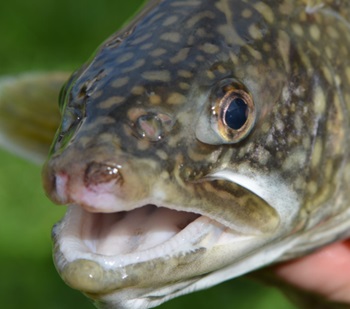 After decades of work, fishery managers say lake trout have fully recovered in most of Lake Superior after the invasive, fish-killing sea lamprey decimated their numbers. The Lake Superior Committee of the Great Lakes Fishery Commission, which is made up of state, tribal and Canadian natural resource managers, announced the population’s recovery Wednesday. The lake trout population in Lake Superior dropped to dramatically low levels during the mid-1900s due to overfishing and an invasion of sea lampreys, eel-like parasites that suck the blood of their hosts. The parasitic fish spread to the Great Lakes from the Atlantic Ocean, invading Lake Superior by 1938. more, >>CLICK TO READ<< 11:03
After decades of work, fishery managers say lake trout have fully recovered in most of Lake Superior after the invasive, fish-killing sea lamprey decimated their numbers. The Lake Superior Committee of the Great Lakes Fishery Commission, which is made up of state, tribal and Canadian natural resource managers, announced the population’s recovery Wednesday. The lake trout population in Lake Superior dropped to dramatically low levels during the mid-1900s due to overfishing and an invasion of sea lampreys, eel-like parasites that suck the blood of their hosts. The parasitic fish spread to the Great Lakes from the Atlantic Ocean, invading Lake Superior by 1938. more, >>CLICK TO READ<< 11:03
U.S. International Trade Commission votes in favor of antidumping, countervailing duties on shrimp imports
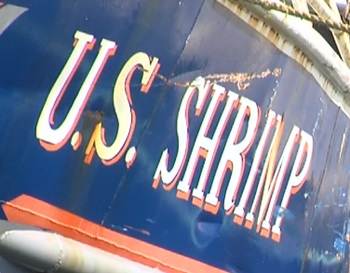 Southeast Texas fishermen are celebrating a win after the U.S. International Trade Commission voted in favor of antidumping and countervailing duties on shrimp imports from four countries. On Wednesday morning, the U.S. International Trade Commission voted in favor of antidumping and countervailing duty petitions filed by the American Shrimp Processors Association against imports of frozen warm-water shrimp from Ecuador, India, Indonesia, and Vietnam. As a result of the commission’s vote, duties ranging from 2.84% to 221.82% will be imposed on imports of shrimp from the four countries. “We are thrilled with the outcome of today’s vote,” said Trey Pearson, president of ASPA. more, >>CLICK TO READ<< 13:19
Southeast Texas fishermen are celebrating a win after the U.S. International Trade Commission voted in favor of antidumping and countervailing duties on shrimp imports from four countries. On Wednesday morning, the U.S. International Trade Commission voted in favor of antidumping and countervailing duty petitions filed by the American Shrimp Processors Association against imports of frozen warm-water shrimp from Ecuador, India, Indonesia, and Vietnam. As a result of the commission’s vote, duties ranging from 2.84% to 221.82% will be imposed on imports of shrimp from the four countries. “We are thrilled with the outcome of today’s vote,” said Trey Pearson, president of ASPA. more, >>CLICK TO READ<< 13:19






